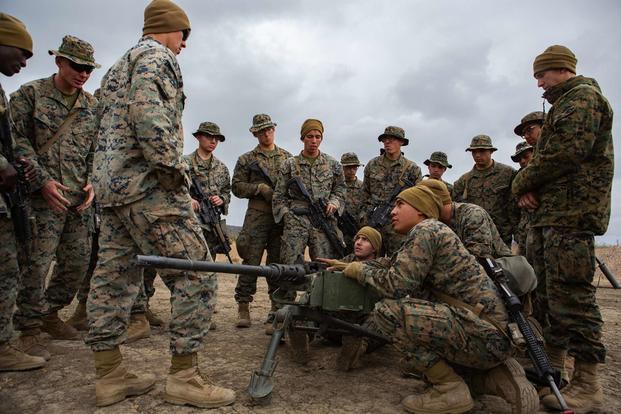The Marine Corps has inked a $10 million contract with ammunition-maker MAC LLC for new lightweight polymer machine-gun ammunition, a major step forward in an effort to lighten Marines' battlefield load.
The contract was awarded to the Mississippi-based company Thursday, Marine Corps Systems Command officials said in a news release. According to the announcement, the command will get a "small quantity" of the ammunition this fall and in the fourth quarter of fiscal 2021.
"Marines will assess the ammo to increase familiarity and validate the polymer rounds during an Operational Validation scheduled for the third quarter of fiscal year 2021," MCSC officials said in the release. "The program office estimates fielding will begin in fiscal year 2022."
The Marines' M2 Browning .50-caliber heavy machine gun, known affectionately as "Ma Deuce," takes .50 BMG cartridges and can fire over 600 rounds per minute. Guns.com reported last April that the Marine Corps planned to buy up to 2.4 million rounds of MAC's polymer ammo, which is up to 30% lighter than brass-cased conventional rounds.
Related: Army Body Armor May Be Too Heavy for Combat, Report Finds
Officials with MCSC indicated the service plans to replace all its brass ammunition with polymer and swap out steel ammunition cans with polymer counterparts. The metal links that hold rounds will also be replaced by nylon, according to the Thursday release.
"Polymer ammunition meets the same specifications for effectiveness as the brass ammo," Lt. Col. Bill Lanham, MCSC's deputy program manager for Ammunition, said in a statement.
Polymer, a plastic-like substance, also tolerates heat better than brass, meaning guns stay cooler and the likelihood of parts breaking and wearing down is reduced. This also allows Marines to fire for longer stretches without jams and other technical problems, John Carpenter, assistant program manager for engineering with PM Ammunition, noted in the release.
"What you're seeing is not a quick surge of new technology, but the work of engineers, project officers and logisticians for the past decade," Carpenter said. "The goal is to provide innovative and effective technology for the Marine Corps."
The Navy plans to partner with the Marine Corps on continued lightweight ammunition research as it pursues its own effort to develop lighter-weight cartridges in small calibers, officials said. The Army is also looking into a 7.62 polymer round.
The literal heavy burden on Army and Marine Corps infantry has been a longtime subject of concern for military officials. A 2018 study from the Center for a New American Security found soldiers routinely carried loads of 119 pounds Iraq and Afghanistan, and one-third of all medical evacuations between 2004 and 2007 were due to musculoskeletal, spinal and tendon injuries, not from combat wounds.
Heavy ammo also comes with a cost on the military supply chain.
"Everything goes on a boat, ship or plane," Carpenter said. "But when we reduce the weight of ammunition, we also reduce the number of vehicles in a convoy, amount of funding and the number of Marines we put in harm's way."
-- Hope Hodge Seck can be reached at hope.seck@military.com. Follow her on Twitter at @HopeSeck.
Read more: Federal Ammunition Unveils New Deep-Penetrating .380 Hollow Point Ammo













